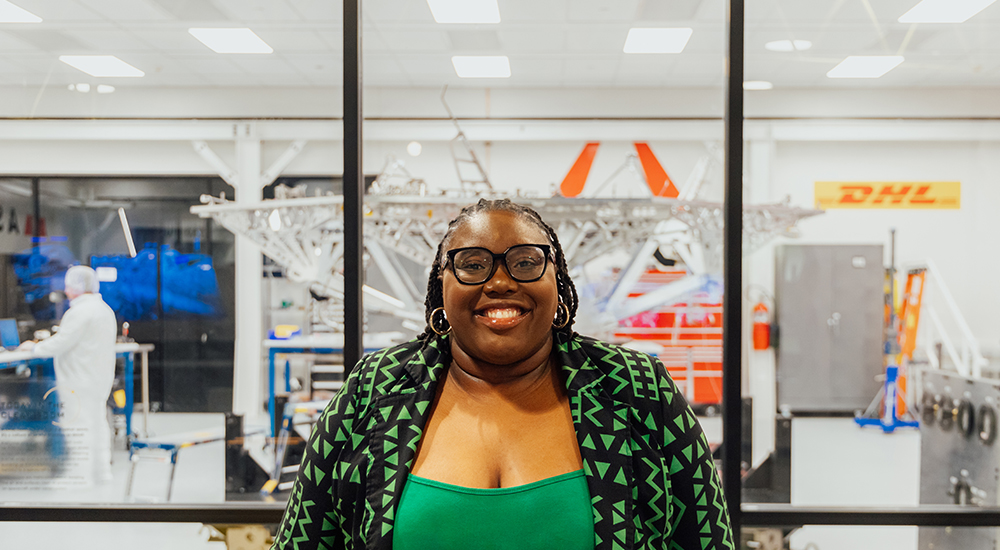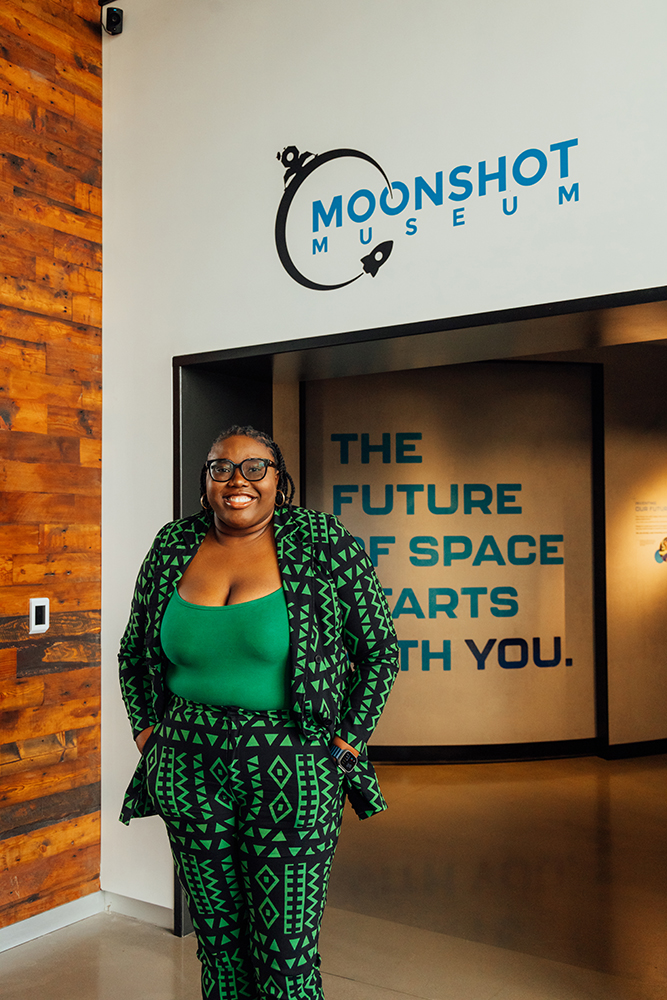Community Engagement Alumna Jimyse Brown, Ph.D., is Making History and an Impact at Pittsburgh's Moonshot Museum Alumni Profile

Alumna Jimyse Brown, Ph.D., poses for a photo in front of Astrobotic’s Clean Room workshop at Moonshot Museum. Through the view of the workshop, museum visitors can see lunar landers and rovers under construction before they are sent to the Moon’s surface. Photo by Ethan Stoner '25.
Meet Jimyse Brown '22
- Job Title & Employer
- Executive Director, Moonshot Museum
- Major/Program
- Community Engagement-Ph.D.
- Hometown
- Pittsburgh, Pa.
- High School
- Winchester Thurston School
- Now Living In
- Pittsburgh, Pa.
- Hobbies & Interests
- Sports (especially basketball and Pittsburgh's teams), traveling, live entertainment and reading
"The work that you do in the community engagement program is undoubtedly connected to what you want to do professionally. When you attack it with the best intentions in a genuine way and you dive in and give your all, you can be transformed and fully show up in the sector that you desire."
Jimyse Brown '22 might be the first, but she will ensure she is not the last.
As the executive director of Moonshot Museum, the Ph.D. in Community Engagement alumna is the first Black person to lead a space museum in Pennsylvania and the first Black person globally to run a space museum focused on career readiness for the 21st-century space industry.
"It is pretty surreal, especially considering my diverse experiences and how they have uniquely prepared me for this role in the space industry," Dr. Brown said. "It is an honor that the board trusts me and believes in my ability to execute the mission and move us forward to usher in the next wave of space industry professionals."
Moonshot Museum, located on the Northside, shares a building with the aerospace company Astrobotic and invites visitors of all ages and education levels to engage with space exploration, watch real-time assembly of lunar spacecraft and discover career opportunities in the space industry. The museum shines a bright light on Pittsburgh's role in space while offering educational programming and hands-on exhibits that inspire curiosity and connections.
"We want to collaborate, partner, invest in and show up for the community," Dr. Brown said. "We want people to find their space and place in space."
Dr. Brown's previous roles include working for Pittsburgh Public Schools as a project assistant at Pittsburgh Arlington PreK-8, doing behavioral work for Pittsburgh Faison K-5, teaching 4th-8th grade P.E. and 5th and 6th-grade social emotional learning (SEL) at St. Edmunds Academy and chairing the City as Our Campus program at Winchester Thurston School. In the Q&A below, learn more about Dr. Brown's exciting role at Moonshot Museum and her Point Park experience.
Why did you choose Point Park’s Ph.D. in Community Engagement?
I was looking for a way to advance my career. I was thinking of doing that through education, and l had looked at a couple other schools. I had done a lot of servant leadership already. I was already involved in the community, and I found it unique that there was a program solely focused on that and not just through a certificate or a general class, but an actual degree program. I loved that it was close to home, and I had the opportunity to be on campus. With the combination of all of those factors, I thought it was a worthwhile pursuit.
How did it foster your professional and personal development?
My cohort members are amazing. The late Dr. India Christian and Dr. Tiffany Pitts were my rock going through the program. It was life-changing having met them. There were others, too, like Dr. Jessica Ruffin and Dr. Annie Fiffick, who were also amazing, and we all stay in touch. There was just something about them having the ability to help me grow as a person, professional and practitioner that was really great.
I appreciated how the program helped me develop an understanding of the language and legislation surrounding some of the work I was already doing. It also helped me find ways to move forward in a more efficient, effective manner and package that in a quantifiable or qualitative framework or strategy to help galvanize and get others to support what I am passionate about. People find passions; however, when it comes to finding funding, sometimes that’s where there are roadblocks. Through the Ph.D. program, I gained the knowledge to understand how to navigate that, get into the correct rooms and figure out who I need on my side to push things forward, not for short-term gratification, but for systemic change.

What was your dissertation topic, and what were your key takeaways?
My dissertation examined the levels of care for Black student-athletes in predominantly white secondary schools. It was a look at the academic, athletic and social care gaps.
I learned that there is a shared trauma for Black student-athletes within those sectors, and there is a lack of support from the administration for students, as well for the educators who want to help, but their ability to assist is also limited by fear of retaliation or termination. I learned how the trauma impacts the child and manifests in different ways, and, overall, there was a gap in actually addressing what students needed.
The biggest takeaway was that their experiences were not isolated; instead, they revealed common themes often overlooked, highlighting the critical need for targeted support. The same experience, even if it manifested at a different school or organization, still spat out the same generalized, thematic experience across the county.
My dissertation was professionally and personally affirming because normally when you go through those experiences, others try to make it seem as if you’re crazy or you don’t know what you’re talking about. I used former student-athletes within the study because as we get older, we gather the ability to understand what we have gone through in life and put a name to it. Having these former student-athletes reflect back and understand how something was supportive or detrimental, was very useful. It was personally affirming that I wasn’t crazy either. Conducting this study required me to remain objective, as some of the participants’ experiences resonated with my own, deepening my understanding of their challenges.
Describe your new role and what it entails.
I am the executive director at Moonshot Museum. My role is fully focused on being able to diversify the space industry and utilizing the museum, our programs and resources to accomplish that. It covers everything, from oversight of program creation and implementation to design and structure of our museum, as well as fundraising, community engagement, grant writing and overseeing our great team of 30+ volunteers, four part-time staff and two full-time staff. We secured an $800,000 NASA grant to enhance our outreach and programming, specifically focusing on middle school students and helping them explore career opportunities in the space industry. It’s cool that I now have the ability to oversee a NASA grant – something I never thought I would have been able to do, something that I didn't think was on my trajectory.
What does it mean to you to lead the Moonshot Museum?
It is an honor and a privilege, not only because of the great work being done here that we get to continue on, but because I have the opportunity to work within a sector that was nowhere on my radar.
To be a Black woman in this role from Pittsburgh is something I don’t take for granted. I know that when I show up into spaces, there are other people who will feel welcomed when they might not have before. That is not to say it was the museum was off-putting or exclusive; I believe that being able to have a physical manifestation of who you are and who you want to be is important to add some realism to a goal one wants to achieve.
We’re very adamant that Pittsburgh is a leader in the space industry and we want people to know about that and our abilities to contribute to history. Having that tie of being a hometown kid and getting to represent the city as a whole feels amazing because I am a huge Yinzer.
I want to make sure that I am using my platform, network and knowledge to usher in others so that I am not the last. I might be the first, but I don’t want to be the last.
What do you hope to accomplish in this role?
I would love to diversify the demographic of who we work with, and I mean that from all angles. I am committed to developing initiatives that promote inclusivity across various demographics, ensuring access for individuals from diverse backgrounds. Are we able to help with access for those with physical or neurological needs? Are we diversifying the school districts? Are we hosting a range of Title I schools, charters and independents? Are we able to reach greater race or ethnic diversification through that? I believe we have to start with access because access equals opportunity.
I would love for us to be a vessel of opportunity for others, such as offering internships. An educational path is needed for students interested in the space industry to help them navigate that. I want to be able to say, “Through our programs, we’ve been able to increase the diversity of the space industry by X amount.” I want to see some of the kids who visit us, the adults even, become the people who are behind our museum's glass windows that showcase Astrobotic’s workshop. I want them to be on the next mission to the Moon or Mars. I want them to be the graphic designer behind the next mission patch for NASA. Whether they work in the space industry or not, I want it to be their choice; not because they didn’t have an opportunity.
What do you want people to know about the museum?
We invite the community to visit us! Moonshot Museum is open to the public Thursday through Sunday from 11 a.m. to 4 p.m. Additionally, we provide private programming from Monday to Wednesday and offer event rentals seven days a week. We encourage everyone to find ways to engage with Moonshot in some shape or form, whether through our educational programs, events or partnerships. We have great programs that are suitable for any audience, no matter where you’re at in your educational journey. The team here is amazing. We’ve done work with Pittsburgh Public Schools and storytimes with Carnegie Library of Pittsburgh. Our museum is not a one-stop visit because we are so high-tech. You can come in for one experience, and we can flip some of these interactives and exhibits to give you a totally new experience. We also have new programs coming in the fall and spring that are a result of our NASA grant.
Why would you recommend Point Park’s Ph.D. in Community Engagement to a prospective student?
The program is very detail-oriented. The work that you do in the community engagement program is undoubtedly connected to what you want to do professionally. When you attack it with the best intentions in a genuine way and you dive in and give your all, you can be transformed and fully show up in the sector that you desire. I’ve seen people go through Point Park and really use their degrees. The degree I earned from Point Park equipped me with critical skills and insights that I apply daily in my role at the Moonshot Museum.

